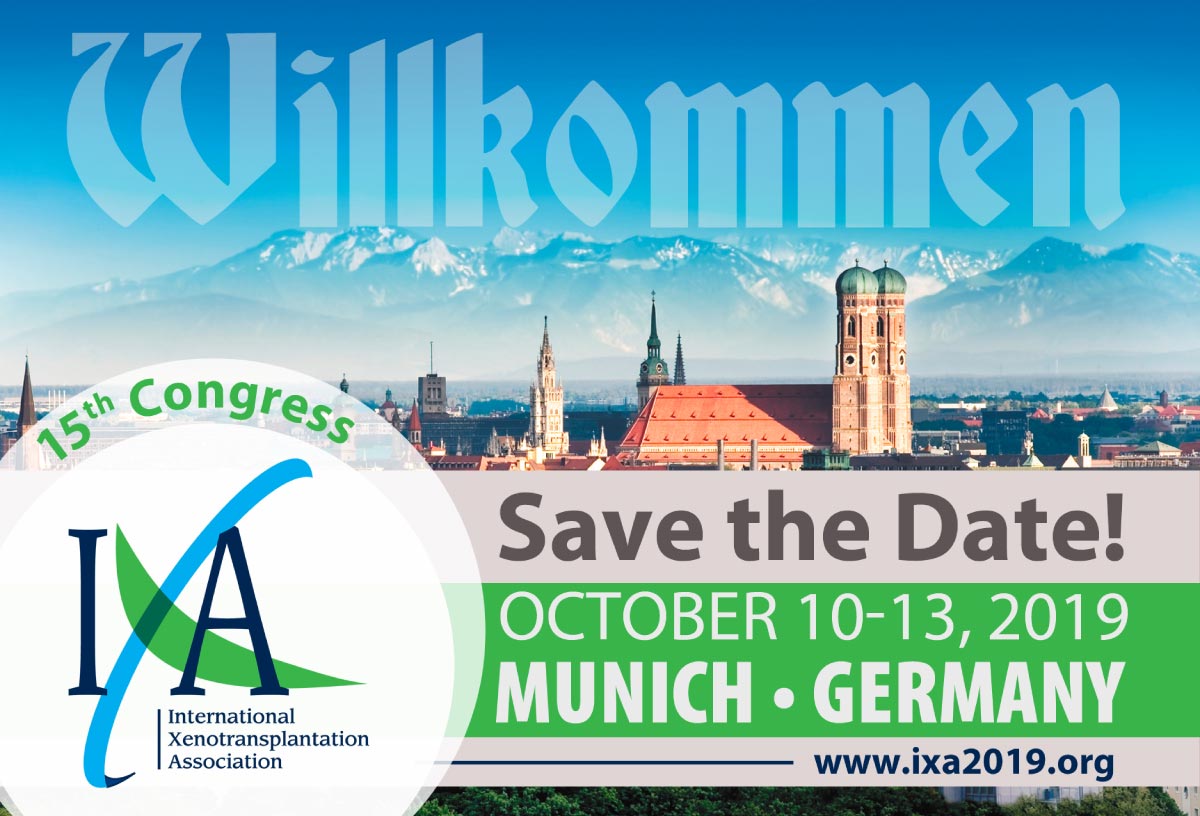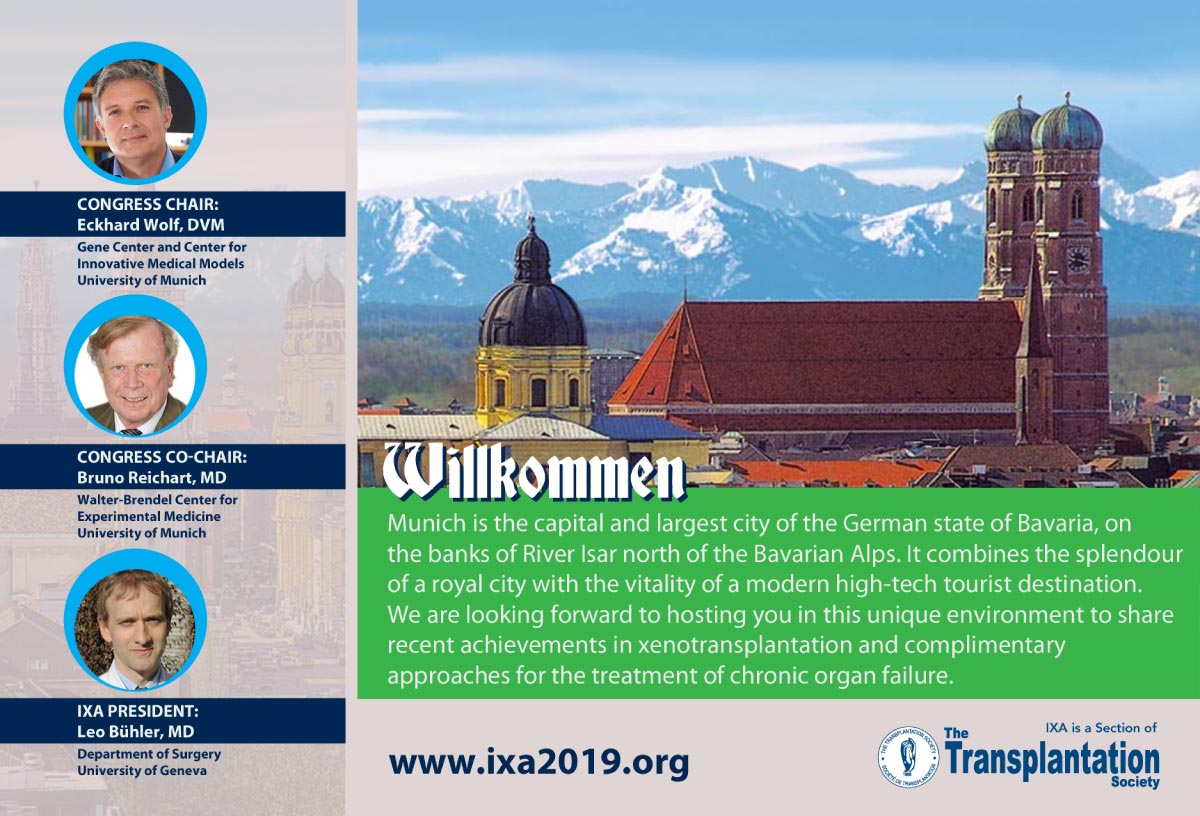IXA Update - April 2018
IXA 2019 CONGRESS


New Presidential Address

Dear IXA members,
Our field of research has taken advantage of recent tools for genetic engineering that have opened us new perspectives and we all look forward to seeing faster advances and achievements.
This year, we will meet for the TTS congress in Madrid, from June 30th to July 5th, where workshops and sessions on xenotransplantation will allow us to be updated on the latest developments. I invite all members to join this important venue and to share their most recent data.
I also would like to suggest you to submit your work to our journal “Xenotransplantation” which has reached the impact factor of 3.96. In contrast to other journals, we accept clinical case-reports and are confident that the impact of our field will continue to grow!
I look forward to seeing you in Madrid,
Leo Buhler
IXA President
Xeno-Lab Introduce
The German Xenotransplantation Research Cluster “Biology of xenogeneic cell, tissue and organ transplantation – from bench to bedside”
Eckhard Wolf, Bruno Reichart
Speakers of the DFG-funded Transregional Collaborative Research Center 127 (TRR127)
The TRR127 is a unique Consortium encompassing basic research on xenogeneic immune mechanisms, generation and evaluation of novel genetically (multi-) modified donor pigs, and preclinical porcine islet, heart valve, and heart transplantation studies. The collaboration of institutions from the Ludwig-Maximilian University Munich, the Technical University Munich, the Hannover Medical School, and the Technical University Dresden is funded by the German Research Council (DFG). Additional participating institutions are the Friedrich Loeffler Institute (Mariensee), the German Primate Centre (Göttingen), the Robert Koch Institute (Berlin), and the Paul Ehrlich Institute (Langen).
The Consortium is structured as three closely interacting Research Areas, supported by Central Projects that focus on ethical, legal and societal issues, microbiological safety, provision of safe donor pigs with effective genetic modifications, and non-human primate (NHP) studies (Fig. 1).

Fig. 1. Structure of the DFG-funded Transregional Collaborative Research Center 127 – TRR127
The five projects in Research Area A investigate and modulate immune mechanisms at the xenograft-host interface. Modifications on the xenograft side include expression of the negative costimulatory molecule PDL1, down-regulation of porcine MHC (SLA) molecules, and expression of pro-angiogenic, anti-inflammatory and anti-thrombotic factors. Modifications on the recipient side target the instant blood-mediated inflammatory reaction (IBMIR) observed after intraportal xeno-islet transplantation. A novel non-lymphopenic humanised mouse model is used for detailed analyses of cellular and non-cellular components of IBMIR. In addition, xenograft-specific regulatory T cells will induce long-lasting xenograft tolerance.
The three projects in Research Area B develop genetically modified donor pigs to overcome rejection and improve graft function. These genetic modifications include elimination of major xenoantigens such as αGal, Neu5Gc and Sd(a), expression of transgenes to combat cellular (LEA29Y, PDL1) and humoral (complement regulators) rejection and to protect the graft (A20, heme oxygenase 1, human thrombomodulin). Another goal is generation of PERV-free donor pigs.
Three projects in Research Area C investigate preclinical islet xenotransplantation. Diabetic mouse models and NHPs are used to test pancreatic islets/beta cells from different sources: wild-type porcine/human islets, stem cell-derived beta cells, and novel genetically modified porcine islets. The Beta-O2 macroencapsulation device will be further improved and a clinical trial is planned. A fourth project provides a platform for studying xenogeneic activation of complement and coagulation. Pertinent assays for NHPs will be developed. These are important for a project that aims to provide cell-free porcine heart valves that lack major xenoantigens. Another project deals with heart transplantation: novel genetic modifications are first evaluated by ex vivo perfusion of organs with human blood in a bi-ventricular system. The most promising genetic modifications then proceed to orthotopic transplantation experiments in baboons using oxygenated cardioprotective solution and anti-CD40/PASylated anti-CD40L based immunosuppression.
More information on the individual projects and their recent achievements can be found on the TRR127 website (http://www.klinikum.uni-muenchen.de/SFB-TRR-127/de/index.html).
Our Consortium is very pleased to host the 2019 IXA Conference in Munich, Germany. We kindly invite you to visit us and share with us the enthusiasm of moving xenotransplantation to clinical application.

IXA Vanguard Committee update

The Vanguard Committee provides a forum for student and junior faculty of the IXA to share ideas with their peers and foster their scientific development. Members can keep current with the latest news of interest to them by following the Vanguard Committee on Twitter @ixa-vanguard or Facebook page by searching for “International Xenotransplantation Association (IXA) Vanguard Committee”. If you have any questions or comments, please feel free to contact at ixavanguard@tts.org.
Current 2018 IXA vanguard members
Chair
- Christopher Burlak, University of Minnesota, USA
IXA Council Advisor
- Bernard J. Hering, USA
Members
- Arielle Cimeno, University of Maryland, USA
- Claire Crossan, Glasgow Caledonian University, Scotland
- Mohamed Ezzelarab, Thomas E. Starzl Transplantation Institute University of Pittsburgh, USA
- Beth French, Univeristy of Maryland, USA
- Wayne Hawthorne, University of Sydney, Australia
- Karl Kerns, University of Missouri, USA
- Grace Nauman, Columbia University / Sykes Laboratory, USA
- Bynvant Sandhu, Imperial College London, UK
Best article in Xenotransplantation Journal

Below is a list of the top 10 downloaded articles from Nov/Dec 2017 to Jan/Feb 2018 in Xenotransplantation.
- Scobie L, Denner J, Schuurman HJ, “Inactivation of porcine endogenous retrovirus in pigs using CRISPR-Cas9, editorial commentary”, vol. 25, no. 6, Nov 2017
- French BM, Sendil S, Pierson RN 3rd, Azimzadeh AM, “The role of sialic acids in the immune recognition of xenografts.”, vol. 24, no. 6, Nov 2017.
- Güell M, Niu D, Kan Y, George H, Wang T, Lee IH, Wang G, Church G, Yang L, “PERV inactivation is necessary to guarantee absence of pig-to-patient PERVs transmission in xenotransplantation”, vol. 24, no. 6, Nov 2017.
- Li M, Eckl J, Abicht JM, Mayr T, Reichart B, Schendel DJ, Pohla H, “Induction of porcine-specific regulatory T cells with high specificity and expression of IL-10 and TGF-β1 using baboon-derived tolerogenic dendritic cells.”, vol. 25, no. 1, Jan 2018
- Shin JS, Kim JM, Min BH, Yoon IH, Kim HJ, Kim JS, Kim YH, Kang SJ, Kim J, Kang HJ, Lim DG, Hwang ES, Ha J, Kim SJ, Park WB, Park CG, “Pre-clinical results in pig-to-non-human primate islet xenotransplantation using anti-CD40 antibody (2C10R4)-based immunosuppression.”, vol. 25, no. 1, Jan 2018.
- Lee EM, Jung JI, Alam Z, Yi HG, Kim H, Choi JW, Hurh S, Kim YJ, Jeong JC, Yang J, Oh KH, Kim HC, Lee BC, Choi I, Cho DW, Ahn C, “Effect of an oxygen-generating scaffold on the viability and insulin secretion function of porcine neonatal pancreatic cell clusters”, Epub ahead of print, Jan 2018.
- Min BH, Shin JS, Kim JM, Kang SJ, Kim HJ, Yoon IH, Park SK, Choi JW, Lee MS, Park CG, “Delayed revascularization of islets after transplantation by IL-6 blockade in pig to non-human primate islet xenotransplantation model”, vol. 25, no. 1, Jan 2018
- Chan JL, Singh AK, Corcoran PC, Thomas ML, Lewis BG, Ayares DL, Vaught T, Horvath KA, Mohiuddin MM. “Encouraging experience using multi-transgenic xenografts in a pig-to-baboon cardiac xenotransplantation model”, vol. 24, no. 6, Nov 2017.
- Puga Yung G, Bongoni AK, Pradier A, Madelon N, Papaserafeim M, Sfriso R, Ayares DL, Wolf E, Klymiuk N, Bähr A, Constantinescu MA, Voegelin E, Kiermeir D, Jenni H, Rieben R, Seebach JD, “Release of pig leukocytes and reduced human NK cell recruitment during ex vivo perfusion of HLA-E/human CD46 double-transgenic pig limbs with human blood.”, vol. 25, no. 1, Jan 2018.
- Ma X, Yang C, Zhang J, Wang J, Li W, Xu C, Rong P, Ye B, Wu M, Jiang J, Yi S, Wang W, “Culturing with modified EGM2 medium enhances porcine neonatal islet-like cell clusters resistance to apoptosis in islet xenotransplantation.” vol. 25, no. 1, Jan 2018
XenoTx Events in TTS2018 Madrid

The 27th International Congress of The Transplantation Society will be held in Madrid, Spain from June 30-July 5, 2018 and the IXA will be well represented by several informative lectures on topics of great interest to our members. We hope to see many members in attendance at these and other events to show support for our colleagues and to take advantage of prime networking opportunities available.
Sunday July 1st (9:00-13:00)
Pre-Congress Workshop, entitled Xenotransplantation: Advancing to the Clinic.
A pre-Congress workshop will be held on Sunday morning, July 1st, entitled Xenotransplantation: Advancing to the Clinic. This workshop will highlight the significant progress over the last 5 years in large animal models of cell and organ xenotransplantation and the outlook for the first clinical trials, topics that will certainly generate enthusiasm from its participants.
Monday, July 2nd (16:30-17:30)
A Campfire Session on: New Approaches in Xenotransplantation.
Monday, July 2nd will include a Campfire session on New Approaches in Xenotransplantation chaired by Drs. David KC Cooper, a past president and honorary member of IXA, and Kazuhiko Yamada, a former IXA Councilor. Lectures will be presented on several topics of great interest to our members including progresses made in solid organ xenotransplantation and novel therapeutic approaches aimed at overcoming xeno-rejection.
Tuesday, July 3rd (8:30-9:30)
Morning Symposia on: Issues relating to Clinical Xenotransplantation.
A Tuesday morning, July 3rd, Symposium on issues relating to clinical xenotransplantation will address the importance of genetically engineered pigs in advancing organ xenotransplantation as well as a discussion on recent developments in islet encapsulation strategies compared to free porcine islet xenotransplantation. The importance of the pig in xenotransplantation insures that these lectures will be highly informative and well attended.
Wednesday July 4th (14:30-16:00)
State-of-the-Art Session: Clinical Xenotransplantation – How close are we?
On July 4th, a State-of-the-Art session will address how close we are to bringing xenotransplantation into the clinic. Lectures by world-leaders will focus on kidney, islet and heart transplantation.
Please take the time to look over the online program for the Congress and consider registering to attend any of the many additional events that are available to satisfy a wide-range of interests.
Join a session that targets your area of expertise or step outside of the box and be exposed to new ideas that can spark your imagination. We look forward to seeing you in Madrid.
Social
Address
International Xenotransplantation Association
C/O The Transplantation Society
International Headquarters
740 Notre-Dame Ouest
Suite 1245
Montréal, QC, H3C 3X6
Canada



